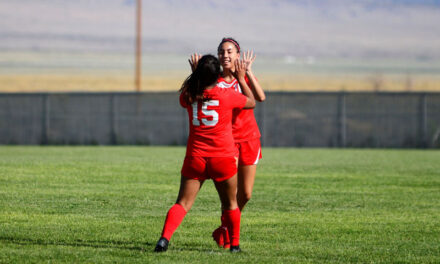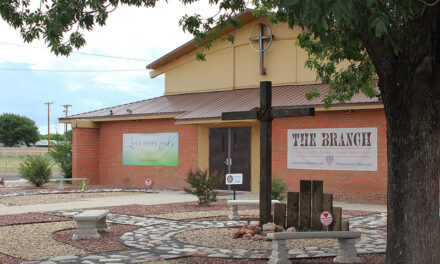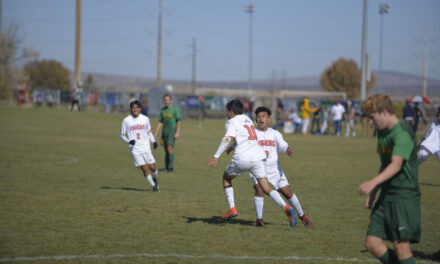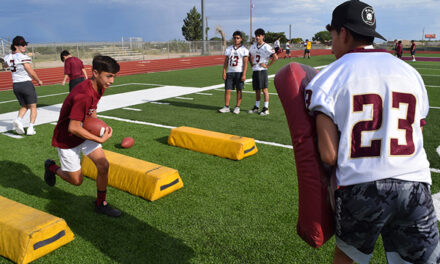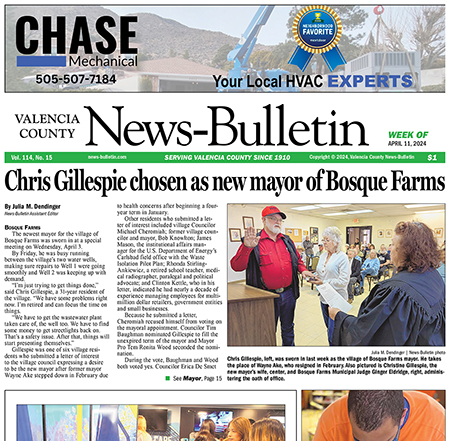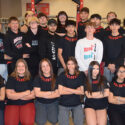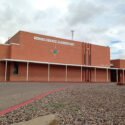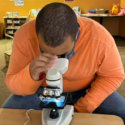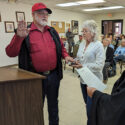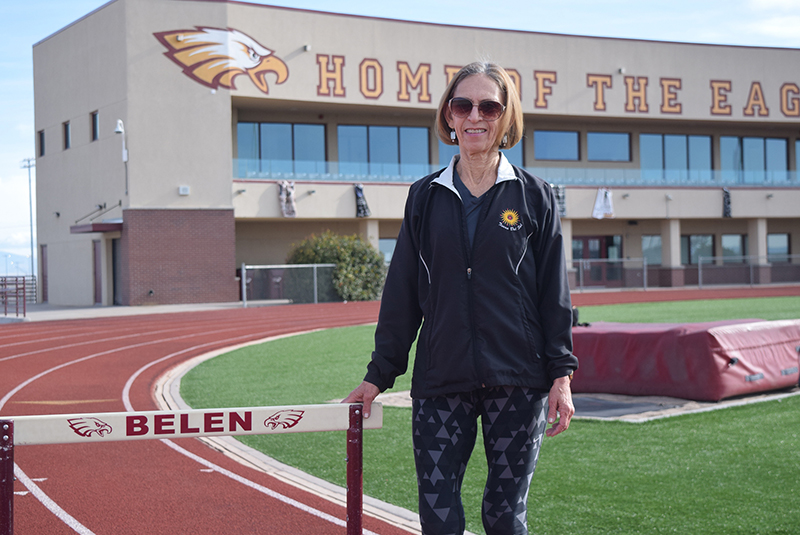
Mike Powers | News-Bulletin photo
Joanne Romero visits Belen High School, where she started the girls’ track program almost 50 years ago.
BELEN — As the high school track season takes off and Women’s History Month crosses the finish line, it seems like the right time to examine a moment that helped girls’ athletics get out of the starting blocks in Valencia County.
It happened during the 1971-72 school year at Belen Junior High School, now Belen Middle School. As a newbie teacher was out jogging, she would hear the pleas.
“It was the girls, begging me for something to do, a sport of their own,” said Joanne Romero, who would teach English in the morning, change clothes and teach physical education in the afternoon.
“They started bugging me about starting a track team,” said Romero. “Women’s lib was just heating up,” and athletic options for girls were just not available.
Romero went to the Belen Board of Education to ask for permission.
“They were really nice about it,” she remembers.
Suddenly, Belen Junior High, with seventh through ninth grades, had girls track.
After all that pleading, did the girls truly want a team?
“I had 70 to 80 girls go out for track. My mouth fell open,” Romero said. “That’s how much the girls wanted something — I had girls galore.”
One of those girls was Leslie Johnson Strommen, who was surprised by those first practices.
“I thought we’d just get out there and run races,” Johnson Strommen said. “I didn’t know we had to develop anything.”
Even though Romero admits to learning on the job, Strommen said, “We didn’t question anything. She completely had all of our trust.”
There was a scramble to find equipment. Some items, apparently left from what was called the Girls Athletic Association, were found in a closet. Starting blocks and “ugly, ugly uniforms” among them.
Although, just like her girls, Romero never had a team to call her own.
“I loved sports and I always considered myself a tomboy,” Romero said.
There was no team at Trinidad High School in Colorado or Adams State University, where she got her degrees. But Adams State, known world-wide for its men’s cross country and track programs, did provide a starting point.
Dr. Joe Vigil, the legendary coach and professor at the Alamosa, Colo., campus would see Romero out running.
“Joanne, come over and run with us,” Romero recalls Vigil saying. “He instilled in me my love for running.”
Back in Belen, after three years at the junior high, Romero followed “the best group of girls I could ask for,” to Belen High School. But before she could start the BHS high school girls’ track team, athletic director Evisalio “Bull” Padilla needed to approve.
Padilla was intimidating, Romero recalled.
“It kind of surprised me because I had always heard how tough he was. I think he was hearing the rumblings of girls’ sports. How it was going to become a thing and he supported me all the way through.”
Johnson remembers team members setting up a booth at a local grocery store, perhaps the Piggly Wiggly, to get petition signatures to take to the school board.
“We didn’t have any push back at all — everybody was really supportive.”
With the school board’s blessing, Romero started her 25-year coaching career at the high school, and the support and investment in the coach and the team paid off quickly.
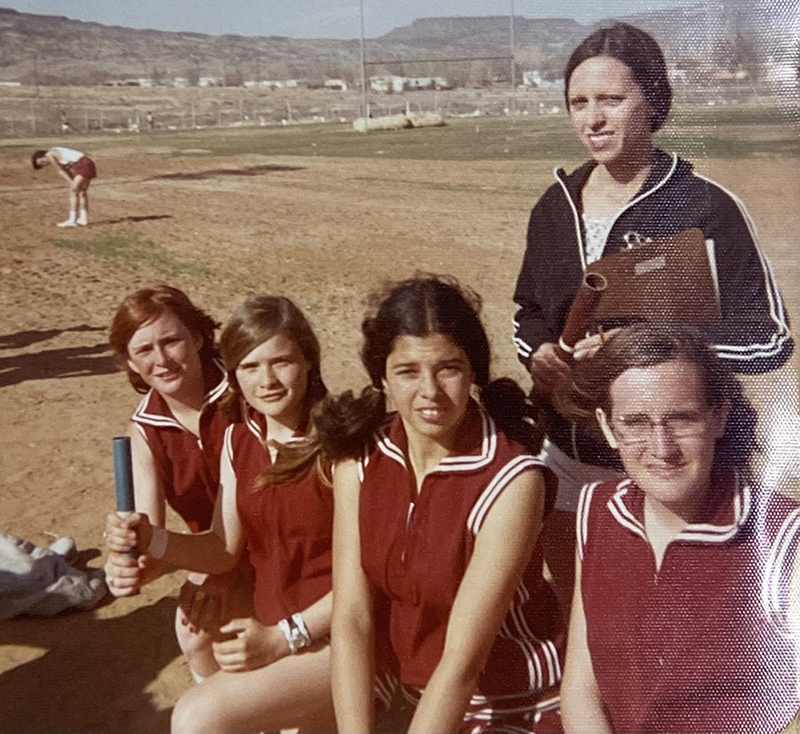
Submitted photo
Coach Joanne Romero, far right, with members of the 1974 Belen Junior High School girls’ track team.
“In 1977, with this group of girls that I had coached for six years (starting at BJHS,) we took state,” Romero recalls. “It’s like a fairy tale story. Really, really cool.”
A check of New Mexico Activities Association records shows Belen was the state’s very first AAA Girls’ State Track Champion. The first boys’ track champion on the list came in 1913, 64 years earlier.
Acceptance hasn’t come easy at some places, but Romero received encouragement from administrators along the way and the parents “were awesome.”
With no background in sports, Romero became a “do-it-yourself” coach, learning as she went. She would be among just a couple of women to attend coaching clinics put on by the NMAA. Romero would corner clinicians to ask specific questions.
“What do I do for this? How do I coach a quarter-miler? They were always so helpful.”
Tow Diehm, the legendary University of New Mexico athletic trainer, was among those Romero leaned on.
“I would always go to his sessions so I would learn how to tape an ankle, tape a hamstring,” she said. “What to do about this and that.”
In 2000, Romero became just the second woman inducted into the New Mexico Coaches Association Hall of Honor. Twenty-three years later, there are still just eight females in the Hall of Honor.
All these years later, Romero’s efforts and lessons are still appreciated by her former athletes.
“Even when you have struggles along the way, you still keep going and push to reach the goals that you set,” Strommen says. “We developed those lifelong friends and that sisterhood of working together.”
Romero, now 76 years old, still stays active. She runs, works out, plays golf and writes articles for the Women’s Golf Association that appear in the News-Bulletin.
When asked if she feels like a ground-breaker for women’s athletics, Romero ponders the question for a moment.
“Yes. Yeah, I do,” she answers. “A pioneer out of demand. I would not have started that track team without the girls nagging me. They got after me. They wouldn’t let up. They were serious. I could have had doors slammed but I didn’t. So, I was a pioneer but I had a lot of help along the way.”
Mike Powers spent more than 40 years as a television news and sports anchor, mostly in the Albuquerque market. He has won numerous awards including New Mexico Sportscaster of the Year. He covers a wide range of sports, including the Valencia County prep scene.

